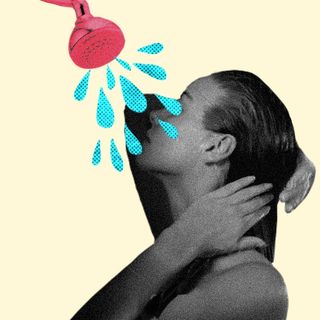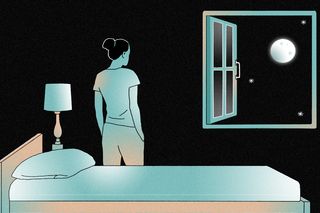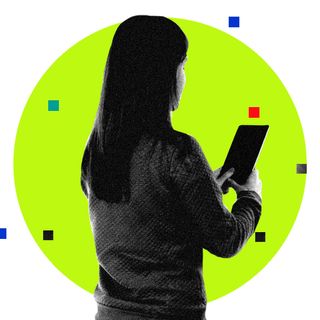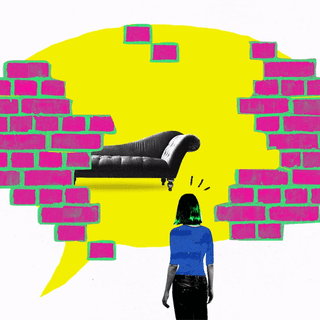
What It’s Like to Live With: Chronic Sleeplessness
“What really bothers me is people thinking an insomniac can’t sleep because they’re not trying hard enough.”

What It’s Like to Live With explores the stories of people who see and experience every day a little differently.
The article below mentions suicidal thoughts.
I’m 29 now, and I have had sleep issues for as far back as I can recall. Throughout my life, I’ve never once slept soundly. Even the sound of a pin hitting the floor would be enough to wake me up. Things started to get particularly bad, though, while I was pursuing my undergraduate degree in 2011. Either I couldn’t get myself to fall asleep, or I would keep waking up — sometimes, more than 10 times a night. Then, there would be nights — many, many of them — when I would stay awake till 3 a.m. and wake up by 7 a.m. But I never took it seriously, then, you know?
My sleeplessness kept getting worse as time passed, though. With my ADHD (Attention Deficit Hyperactivity Disorder) still undiagnosed, I was extremely hyperactive as well. I was also unaware that I was living with OCD (Obsessive-compulsive Disorder) and BPD (Borderline Personality Disorder), too. At the time, I didn’t know much about any form of mental health issues. I had heard people casually call themselves insomniacs — much like many like to say “I have OCD” — simply because they like to keep their surroundings clean.
By the time I took up my first job in 2016 after completing my master’s, I was unable to sleep at all. My roommates in Pune, where I was working, started to worry about my wellbeing. They saw me wide awake around the clock. One of them, my best friend, started switching off all the lights in my room and taking away my phone, laptop, and iPad.
But it didn’t work — hours later, she would still find me reading a book.
My sleeplessness also made me gravitate toward cigarettes and alcohol. While I was awake, I felt the need to indulge myself. Since I’m not someone who’s hungry all the time, I fell back to smoking. Because I was very anxious while being awake and cigarettes made me dizzy, which calmed me down, in a way. Before I knew it, I had become a chain smoker. But neither cigarettes nor alcohol could make me fall asleep.
Related on The Swaddle:
Why Some People Hear Loud Noises While Trying To Fall Asleep
Not being able to sleep at night impacted both my education and career. Because I wasn’t rested, I would be really tired in the morning; I was still wide awake, of course, but I would have these yawning episodes. At times, my eyelids would feel heavy, and resisting the urge to close my eyes would be a task. But my body doesn’t allow me to sleep — so I couldn’t take afternoon naps either to freshen up. I couldn’t really ask for any form of accommodations at the workplace either because I already sensed hostility from my colleagues towardpeople struggling with mental health issues. Once I accidentally overheard a senior colleague advising a new recruit to stay away from me, because she thought I had too many mental health issues that might impact those around me.
I’ve tried to be honest with my immediate managers about my struggles, though. But a former manager of mine had exploited my hyperactivity — because I never slept, he would overburden me with work. At one point, I had to draw a boundary and tell him that I’m available for work only during my scheduled working hours.
Just because I wasn’t sleeping, doesn’t mean I want to work 24*7; I had a personal life, too.
My ex-husband, who I’m currently in the process of getting divorced from, wasn’t very supportive of my struggles. He would constantly taunt me for not sleeping. I still don’t get why — it’s not like I was keeping him up. I’d stay up by myself — reading, researching, writing. I guess, he missed being close to me in bed? He also complained that since I never get any sleep, I’m tired and irritable in the mornings. Being a very sound sleeper himself, what he didn’t understand was that I just couldn’t get myself to sleep.
My family and friends have been supportive through this. My best friend, who I mentioned before, would suggest different kinds of tea she has that help her fall asleep. That doesn’t work for me, but I think it’s sweet that she tries.
Initially, my parents didn’t understand the extent of the mental health issues I was experiencing — they weren’t very informed about mental health in general. My mother used to say that if I just shut my eyes, I’d be able to fall asleep. Of course, I couldn’t — just like tiring myself to sleep didn’t work either. Eventually, when things started to spiral out of control — my undiagnosed BPD was making me suicidal, and the lack of sleep, as you can imagine, makes everything that much worse — my parents began giving me space and helping me in my mental health journey. Now, they even help me take care of my medicine times.
Related on The Swaddle:
Meditation And Mindfulness May Lead To Anxiety, Other Adverse Effects In Some: Study
The first time I went to a therapist, she immediately recommended that I see a psychiatrist because things were too far out of hand, by that point. The psychiatrist finally diagnosed me with the spectrum of mental health conditions I live with. Turns out, I have parasomnia, too — even when I’m asleep, I’m aware of everything that’s going on in my surroundings. It’s kind of like an out-of-body experience where I’m half-asleep and half-awake. It also causes me to lucid dream a lot, and as a result, whatever sleep I get, doesn’t end up being very restful. I also experience sleep paralysis.
I was prescribed sleeping pills after my diagnosis. My psychiatrist started me off with mild ones, but they didn’t work on my body. Soon, the dosage was upped. My sleeping pills are different from the ones people usually know of, too, because most medicines don’t work for me. But even so, if I take the medicine I’m on at 10:30 p.m., I’m mostly able to get sleep around 2:30 a.m., and by 6-7 a.m., I’m wide awake again. Without the medicines, of course, I can’t sleep at all.
Meditation — which was recommended to me by someone — is something I just can’t do. I am putting in more effort from my end, and I keep my phone and books away. I’ve also tried listening to calming nature music; the best sound for me in the world is the sound of the rain or ocean waves, but even that doesn’t really help me.
I wish I could say that I’m better these days, but really, I’m not. Even if I’m starting to feel better, the slightest bit of turbulence in my life just undoes the progress. And, right now, with my divorce proceedings going on, things are quite bad. Towards the end of last year, I was actually doing well. But soon after, my sleep went for a toss. Every time that happens, I’m put on heavy medicines again.
What really bothers me is that people think an insomniac can’t sleep because they’re not trying hard enough. It’s like they want to give advice without having any understanding of what they’re talking about. If trying helped, I wouldn’t be here. Nobody likes being tired all the time, nobody wants to be ill.
This interview has been condensed and edited for clarity. As told to Devrupa Rakshit by Rupsha Bose.
Devrupa Rakshit is an Associate Editor at The Swaddle. She is a lawyer by education, a poet by accident, a painter by shaukh, and autistic by birth. You can find her on Instagram @devruparakshit.
Related


Self‑Harm Behavior Online Is Linked to Rise in Suicidal Thoughts: Study
